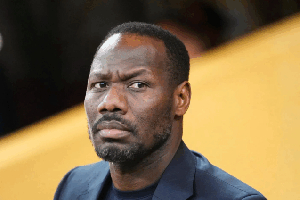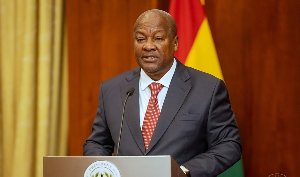General News of Thursday, 4 August 2011
Source: j. ato kobbie, managing editor
Due Diligence Clears Tsikata in $5M MODEC-StratOil Deal
The International Finance Corporation (IFC), the World Bank’s private sector lending arm that raised red flags over a $5Million service contract between MODEC and Strategic Oil and Gas Resources Limited (StratOil), holding all potential investors in the company that owns FPSO Kwame Nkrumah MV 21, to ransom, has surreptitiously sneaked back considering moving forward with its plans to invest in the Jubilee project.
A hint of the stealthy return of the IFC was contained in a terse e-mail message The Business Analyst received from the World Bank affiliate on June 6th this year, after many months of inquiry on the status of a due diligence occasioned by the red flag raised drew blank.
The “IFC is currently considering financing the FPSO that serves the field because it is a critical component of the Jubilee field development,” stated Desmond Dodd, Head of Communications
of the IFC for Sub-Saharan Africa.
Continuing, the IFC said it had “consistently indicated its strong interest in completing the financing and continues to work with the other parties on moving the project forward.”
That response was a marked departure from several others over the past year, when the IFC had insisted the due diligence was still ongoing. However, the IFC still refused to tell The Business Analyst what the findings of the due diligence it requested were.
The U.S. Department of Justice, to which MODEC provided details of the due diligence, also served notice last week Thursday that it was “not going forward with any inquiry relating to MODEC at this time,” a MODEC press release of last week Thursday, July 28, 2011 has revealed.
The release comes exactly one year after the IFC kicked a storm over the possibility of influence-peddling in the MODEC-StratOil service contract, which was signed by Tsatsu Tsikata, a former Chief Executive Officer (CEO) of the Ghana National Petroleum Corporation (GNPC), on June 4, 2008.
It all began in July 2010, when MODEC, the company that won the contract from the Jubilee Partners to construct the floating, production, storage and offloading (FPSO) vessel, submitted lately some sub-contracts related to the contract to an IFC-led consortium of potential investors.
One of these sub-contracts happened to be the Service Contract between MODEC (Mitsui Ocean Development & Engineering Company Limited) and StratOil, a company which has Tsatsu Tsikata, as part owner and Chief Executive.
The sight of Tsikata’s name excited the IFC. It allowed all the other sub-contracts to pass, singled out the MODEC-StratOil deal, and went to town on a hunt for possible underhand dealings in the award of that sub-contract.
Hold-Up & Hunt
MODEC announced on July 27, 2010 that as part of the lease financing for the Jubilee FPSO, under the Representations and Warranties provisions it had “disclosed to the other potential equity partners in Jubilee Ghana MV21 B.V., a special purpose company incorporated in the Netherlands and the lending banks all of the contracts that were executed for this project.”
MODEC said “at the request of one of the equity partners, MODEC is currently undertaking a due diligence of the service agreement with Strategic Oil and Gas Resources Limited” and had retained outside independent counsel for this purpose.
The Multilateral Investment Guarantee Agency (MIGA), also a member of the World Bank Group, in a release dated July 29, 2010 stated that it had, together with MODEC and its wholly-owned subsidiary, Jubilee Ghana MV 21, “today mutually agreed to suspend MIGA’s political risk guarantee contract for the Floating Production Storage and Offloading (FPSO) vessel that will produce and process oil and gas from the Jubilee offshore oil field in Ghana.”
According to the release, “the parties agreed to this suspension in order to conduct due diligence into the conditions of a service contract between MODEC and Strategic Oil and Gas Resources (StratOil).”
“The parties note they agreed on a suspension because of the importance of the project in Ghana and their shared intention to have all issues resolved as soon as possible so that the project can be resumed,” MIGA concluded in the release titled, Joint Statement Re: Jubilee Ghana FPSO.
Conspiracies
Some of the Jubilee Partners got excited and an official of one of them (name withheld) leaked the internal processes to The New Crusading Guide, a local newspaper. The paper then went to town on the same day that MODEC made the first public announcement of the suspension, but with the misinformation that the suspension meant insurance cover on the physical FPSO Kwame Nkrumah MV 21, vessel had been withdrawn and therefore there was a threat to first oil.
As the conspiracy thickened, some of the Jubilee partners reportedly added their own questions, some of which included why GNPC officials had given audience to their MODEC counterparts, a question which was to embarrass them when they were asked which of them had not met the MODEC officials. In fact, it turned out that the CEO of one of them was a golf playmate of the MODEC boss at the time!
That was at a time when Kosmos Energy, one of the Jubilee Partners, was trying to sell its holdings in Ghana to another US compatriot, ExxonMobil, and a lobbyist hired by the former, K. Riva Levinson, had already cited the IFC as one of the agencies she had lobbied to bring pressure to bear on the Government of Ghana, to allow the deal to go through, notwithstanding the fact that GNPC and Ghana’s Minister of Energy, had cited the process as flawed.
A William Wallis analysis of the hold-up in the U.K. Financial Times (FT) of August 5, 2010 pointing to the conspiracy as seen by industry observers, stated:
“They have seized on the issue in an apparent attempt to isolate him (Tsikata) and divide the government as it negotiates a series of critical decisions on development of the oil industry.
“The timing of the disclosure is awkward, with the government under mounting pressure to resolve a separate dispute with Kosmos, the Texan company, over its attempt to sell its stake in the Jubilee field to ExxonMobil. Mr. Tsikata is known to oppose the ExxonMobil deal.”
The report quoted Aidan Heavey, CEO of Tullow Oil, Operator of the Jubilee Field, as saying ‘We went through a very straightforward and transparent process and Modec won the bidding by a mile,’ adding ‘This is not going to hold up the production of first oil.’ (see: http://www.ft.com/cms/s/0/cd8232a8-a0b7-11df-badd-00144feabdc0.html#ixzz1NvDampx2).
Meanwhile, StratOil had insisted at the onset of the furore that the services it rendered to MODEC, contributed largely to the latter winning the contract for the construction of the $875Million FPSO Kwame Nkrumah MV21, with the least quotation but superior technology as well, and delivered within record time.
Tsikata, in a July 17, 2011 press release, following a series of questions posed to the Minister of Energy, Dr. Joe Oteng-Adjei in Parliament by a former Deputy Minister of Energy, Mr. K. T. Hammond, insisted that the contract, which he signed on June 4th, 2008 would stand up to every scrutiny!
He questioned the motives of Mr. Hammond, saying: “The brazen attempt even now by Hon. K. T. Hammond, misusing the high office of Parliament, to cast insinuations and poison the atmosphere against me and any company I am involved with are bound to fail, by the grace of God.”
He was jailed on June 18, 2008 two weeks before the Supreme Court was scheduled to rule on an appeal he had made to get the IFC to testify in his trial, with evidence he was to adduce as part of his defence. The IFC had refused to testify at the High Court, as a court witness, claiming it had immunity from Ghana’s judicial processes. The Appeal Court, quoting the immunity provisions of the International Monetary Fund (IMF), upheld that decision back in 2006, after which the case went to the highest court of the land.
The Supreme Court, eventually ruled on the case on January 19th 2011, declaring that the IFC had no immunity, which meant Tsikata was denied the opportunity to exhaust his defence before he was jailed.
Fishing
On 23rd January this year, MODEC announced that a five-month due diligence carried out by an internationally-recognized law firm specializing in such matters, “found no evidence of any violation of the U.S. Foreign Corrupt Practices Act or any other applicable jurisdiction's anti-bribery laws’ in relation to the award of the service contract to StratOil.
However, within days after the investigations had given that clean bill of health to the process, the IFC went fishing further for possible evidence, by raising further questions but hit a dead end.
Conclusion
Even though some of the Jubilee Partners got excited at the onset of the due diligence with high expectations, The Business Analyst gathered from sources close to them that they all became worried as the process dragged on and appeared unending.
The full impact of the suspension of the potential equity partners’ entry dawned on them when loans they had advanced to MODEC towards the construction of the vessel appeared locked up because plans were that they would be re-imbursed from the expected investment from the IFC-led consortium.
Considering the furore that the suspension and the investigations generated, it is not clear yet why the IFC has not released the findings of the due diligence and whether it was satisfied or not.
The hunt for Tsikata has already delayed the plans for investing in the MODEC subsidiary, Jubilee Ghana MV 21, by a year and it is not clear yet how that will impact on the second phase of the Jubilee project, which is scheduled to commence in 2013. j.atokobbie@yahoo.com












